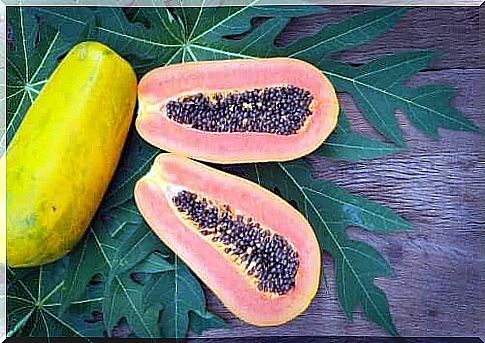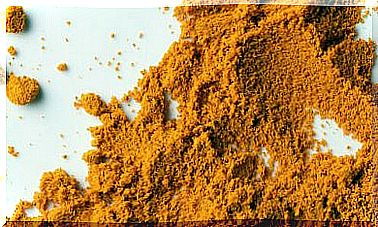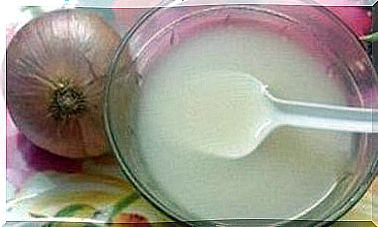Papaya Health Benefits According To Research

Papaya is a fruit that is full of power and has more health benefits than we might think at first glance. Some scientific studies have estimated that the nutrients and antioxidants contained in papaya have positive effects on processes as complex as cancer, inflammatory conditions, and aging. In this article, we want to tell you what the health benefits of papaya are according to research. Read more below!
Why is papaya such a healthy fruit?

Vitamin C is one of the best properties of papaya, as per dose it provides a surprising 144 percent of the recommended daily intake of vitamin C. This makes papaya a great antioxidant in the diet to both stimulate the immune system and fight free radicals.
Another important vitamin contained in papaya is vitamin A, which is needed, for example, to maintain healthy skin, mucous membranes and vision. In addition, it is a particularly effective vitamin for the natural fading of skin pigmentation defects and liver spots.
In addition, papaya contains folate as well as high amounts of fiber and potassium. Fiber and potassium, on the other hand, are important components for cells and the body to help control heart rate and blood pressure.
Papaya contains up to 212 different amino acids as well as several enzymes, including so-called papain. This enzyme has an anti-inflammatory effect on the stomach, so its ingestion helps to enhance the normal functioning of digestion and reduces stomach-related discomforts such as flatulence, bloating and excessive stomach acidity.
Nutritional properties of papaya
- Papaya is rich in water, has a sweet taste and contains only 43 kilocalories per 100 grams.
- Papaya is rich in B vitamins (B1, B2 and B3), a large amount of vitamin C and vitamins A and D.
- Papaya is an important source of fiber.
- In addition, papaya is rich in minerals important for the functioning of the body, such as sodium, potassium, calcium, magnesium, phosphorus, iron, zinc and iodine.
Papaya health benefits according to studies
1. Papaya helps prevent cancer

Papaya’s high vitamin C content and the natural antioxidants it contains play an important role in preventing cancer-causing development.
Foods high in vitamin C have been linked to a lower risk of cancer. Vitamin C in foods helps, among other things, improve the functioning of the immune system, reduce oxidative stress, reduce inflammation, and combat and prevent the formation and activation of carcinogens that cause cancer. There are also indications that lycopene, a member of the carotenoid group found in papaya, has anti-cancer properties that may help prevent various cancers and slow tumor expansion and spread.
2. Papaya is a powerful natural antioxidant
In addition to aging, oxidative damage is a risk factor for many diseases, such as cancer and heart disease. Papaya is also found in a wide variety of antioxidant compounds, mainly carotenoids. Carotenoids are nature’s own compounds that act both as pigments (the yellow, red, and orange colors of food) as well as powerful antioxidants and an important source of vitamin A.
3. Papaya health benefits: it helps to reduce inflammatory conditions
Inflammation is the body’s natural mechanism by which it seeks to protect us from infections caused by bacteria, viruses, or other pathogens. In general, all foods rich in antioxidants and other natural compounds have anti-inflammatory properties, to a greater or lesser extent.
4. Papaya reduces the risk of heart disease
Some studies have suggested that lycopene helps reduce the risk of heart disease due to its ability to combat the effects of free radicals and reduce oxidative stress.
And as we mentioned earlier, papaya also contains very large amounts of vitamin C. Vitamin C acts as a powerful natural antioxidant and has also been shown to help reduce the onset of many chronic diseases and heart disease.
5. Papaya helps count the signs of aging

Aging is a natural process that evolves over time, but which oxidation can help highlight. Foods high in antioxidants, such as papaya in this case, can help reduce the signs of aging; in other words, wrinkles and lifeless and flabby skin, for example, as the antioxidants in papaya help fight oxidative stress, which accelerates the aging process.
In addition, some studies have confirmed that both vitamin C and lycopene in papaya improve the appearance of the skin and reduce the signs of aging. The external use of papaya has also been utilized with very excellent results for the healing of ulcers and other skin lesions, among other things.
6. Papaya health benefits: it helps to improve digestion

There is scientific evidence that consuming papaya can help prevent digestive problems. Subjects analyzed in a study with a papaya-based formula showed improvement in symptoms associated with indigestion, such as edema or flatulence, precisely because of the papain content, which, as we already know, is a substance that promotes digestion and proper digestion of food.
Contraindications
Despite all its benefits, there are certain situations where consuming papaya is not recommended:
- If you often have digestive problems.
- If you have diarrhea.
- If you are taking diuretics (water tablets).
- If you have kidney stones.
Finally, regular consumption of papaya is an excellent and delicious way to fight various diseases such as cancer or heart disease, and studies have shown it. You can add it to your diet the way you want: fresh and natural, as a juice or smoothie, or as a side dish to a salad.









